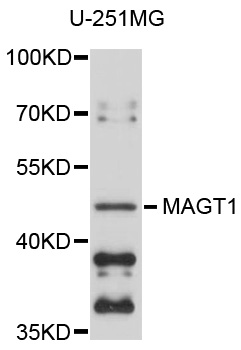-
Product Name
MAGT1 Polyclonal Antibody
- Documents
-
Description
Polyclonal antibody to MAGT1
-
Tested applications
WB
-
Species reactivity
Human
-
Alternative names
MAGT1 antibody; IAP antibody; MRX95 antibody; OST3B antibody; PRO0756 antibody; XMEN antibody; bA217H1.1 antibody; magnesium transporter 1 antibody
-
Isotype
Rabbit IgG
-
Preparation
Antigen: Recombinant fusion protein containing a sequence corresponding to amino acids 60-220 of human MAGT1 (NP_115497.4).
-
Clonality
Polyclonal
-
Formulation
PBS with 0.02% sodium azide, 50% glycerol, pH7.3.
-
Storage instructions
Store at -20℃. Avoid freeze / thaw cycles.
-
Applications
WB 1:500 - 1:1000
-
Validations

Western blot - MAGT1 Polyclonal Antibody
Western blot analysis of extracts of U-251MG cells, using MAGT1 antibody at 1:1000 dilution.Secondary antibody: HRP Goat Anti-Rabbit IgG (H+L) at 1:10000 dilution.Lysates/proteins: 25ug per lane.Blocking buffer: 3% nonfat dry milk in TBST.Detection: ECL Basic Kit .Exposure time: 90s.
-
Background
Acts as accessory component of the N-oligosaccharyl transferase (OST) complex which catalyzes the transfer of a high mannose oligosaccharide from a lipid-linked oligosaccharide donor to an asparagine residue within an Asn-X-Ser/Thr consensus motif in nascent polypeptide chains. Involved in N-glycosylation of STT3B-dependent substrates. Specifically required for the glycosylation of a subset of acceptor sites that are near cysteine residues; in this function seems to act redundantly with TUSC3. In its oxidized form proposed to form transient mixed disulfides with a glycoprotein substrate to facilitate access of STT3B to the unmodified acceptor site. Has also oxidoreductase-independent functions in the STT3B-containing OST complex possibly involving substrate recognition.; May be involved in Mg(2+) transport in epithelial cells.
Related Products / Services
Please note: All products are "FOR RESEARCH USE ONLY AND ARE NOT INTENDED FOR DIAGNOSTIC OR THERAPEUTIC USE"
